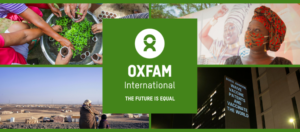A Wealth Tax on the high income earners and the Uber-rich in Kenya could potentially earn the East African nation as much as 125 Billion Kenyan Shillings in additional revenue. This is according to Oxfam International which is a charity organization.

The charity organization in a fresh report on inequality made it known that a wealth tax of at least two (2) percent on everyone with a net worth of 5 million dollars (which is around 585 million Kenyan Shillings), a three (3) percent wealth tax on everyone with a net worth of 50 million dollars (which is around 5.85 Billion Kenyan Shillings) and beyond up until the 1 Billion dollar mark, and a five (5) percent wealth tax on everyone with a net worth of 1 Billion dollars (which is around 117 Billion Kenyan Shillings), would earn the nation’s treasury an additional 900 million dollars which will be around 1.05 billion Kenyan Shillings. The figure is reportedly equivalent to one third of the Kenyan government’s total budget for healthcare.
A tax arrangement that is either disciplinary or progressive would increase the rate on the 50 million dollar wealth bracket to five (5) percent. Oxfam International believes that a 10 percent levy on those with 1 billion dollar net worths will generate 1.1 billion dollars (125 billion Kenyan Shillings.
The Kenyan Treasury has in recent times considered introducing a higher too tax rate or wealth tax in a bid to ensure that the tax system is to a certain extent, more balanced. It has however been unable to secure the needed legislative approval needed for that.
Oxfam International believes that the wealth tax will however, need a proper enforcement of the laws which ensure that companies reveal the necessary information on beneficial ownerships. Doing this will enable the Kenya Revenue Authority (KRA) effectively identify the individuals with high net worths for much easier administration.
The Pan African Director of Oxfam International; Peter Kamalingin stated that, “African countries, including Kenya, need more wealth taxes that are specifically geared towards distributing wealth as opposed to income.”
He added that, “Taxes on property, ownership of land, income derived from ownership of land, personal capital income (dividends, interest and capital gains tax), inheritance and gift taxes should be targeted.”

The passing of a wealth tax or higher top tax on high income earners in Kenya is also being seen as a means to ensure that the wealthy in the country, pay their fair share of taxes.
The National Treasury had in 2018, proposed a number of changes to the Income Tax Act of Kenya. The changes included a proposed higher maximum tax rate of 35 percent to be implemented for incomes of over 9 million Kenyan Shillings per year or 750,000 Kenyan Shillings per month. At that point in time the Top Tax stood at 30 percent on any income that exceeded 47,059 Kenyan Shillings per month or 564,709 Kenyan Shillings per year.
However, the proposal by the National Treasury was taken back due to a lack of public support for said proposal. According to reports high earners in more developed countries especially, pay a top rate of tax that is significantly higher.
In Germany, South Africa, Japan and China, top earners pay a tax rate of 45 percent. The United Kingdom (UK)’s Top Individual Tax Rate stands at 45 percent on any yearly income above 150,000 British pounds (which is more than 23.1 million Kenyan Shillings).
For France its citizens, pay 45 percent as well on earnings above 152,260 Euros (which is around 19.6 million Kenyan Shillings).
Read Also: How To Purchase Safaricom Shares
Citizens of the United States (US) and residents alike who get taxed on their worldwide income, pay a 37 percent top tax for all earnings that exceed 518,401 dollars per year (which is around 60.65 million Kenyan Shillings).

On the East African front Uganda in 2020, changed its Top Tax rate for all yearly income above 120 million Ugandan Shillings (which is around 3.86 million Kenyan Shillings) to 40 percent from its previous rate of 30 percent.
It is important to note that Oxfam International provided a warning stating that the imposing of a wealth tax or adjustment of Top Tax rates is not the solution to the problem of inequality or the lack of spending on public amenities in Kenya. It believes that reforms in the area of fiscal transparency as it is also necessary before the effects of any additional tax would be seen.
In the words of Oxfam International’s Pan African Director; Peter Kamalingin, “Simply raising taxes on the wealthy will not necessarily result in those taxes being spent on public services and social protection. There is no guarantee that increased tax revenues will be spent tackling poverty and inequality,” said Mr Kamalingin.”

The Director added that, “Transparency and accountability are critical so that the public can hold their governments to account for how they spend public funds.”
Read Also: Safaricom Now Has 10,000 Millionaire Investors
Getting rid of the tax incentives that have of costs running into billions of Kenyan Shillings by the National Treasury in foregone revenue is also believed to be another way of generating more funds and also reducing the burden on the tax payers.
Wealthy companies have according to reports, benefited the most from the tax incentives which according to estimates are worth over 470 Billion Kenyan Shillings a figure which is equivalent to 4.6 percent of the total Gross Domestic Product (GDP) of Kenya.
The International Monetary Fund (IMF) has in the past encouraged the Kenyan government to remove the exemptions in Value Added Taxes (VATs) stating that it (the government) needs to ensure that it improves its performance revenue wise so as to reduce the occurrence of public borrowing as well as the fiscal deficit.
The Oxfam International says that the incentives for the most part do not guarantee the necessary benefits to justify their existence, adding that they also lack transparency.
How informative was this article? Are there any other news topics, categories, or How To topics, that you would like us to write on? Feel free to reach out to Mpesa Pay in the comment section.


